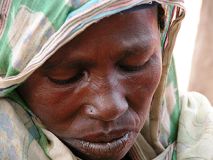Growing insecurity makes quick return of Darfur refugees unlikely-ICRC
By UTA HARNISCHFEGER
GENEVA, June 2, 2005 (AP) — Growing lawlessness and tribal hostilities in Darfur make it unlikely that the 2 million people who have fled their homes in the Sudanese region will be able to return soon, the international Red Cross said Thursday.

|
|
Many of the refugees’ faces in Breidjing camp in eastern Chad reflect their immense suffering and the doubts over when it will be safe to go home. (WFP). . |
Although there is now less violence, the refugees are reluctant to return home because they may not be able to reclaim land they own, said Dominik Stillhart, Sudan chief at the International Committee of the Red Cross.
“The fact that the people can’t go back to work their fields that they used to have … is going to be the real issue in Darfur,” Stillhart said. “There is hardly any fighting between government-armed militia on the one and Darfur rebels on the other side … but there is an increasing disintegration of the conflict and lawlessness.”
The growing lack of law and order in Darfur and lingering conflicts among the 30 to 90 tribes in western Sudan are preventing refugees from returning home, he said.
Stillhart said that planned peace talks, set for June 10 in Nigeria’s capital, Abuja, are insufficient because they do not address intertribal conflicts in the region. The talks, mediated by African Union and Chad officials, will bring together the Sudanese government and Darfur rebels to negotiate terms of a settlement.
“Tribal reconciliation is imperative in order to find a peaceful solution to Darfur,” he said.
Two years of fighting in Darfur, in which government-aligned Arab militias have ransacked villages, has created what the United Nations labels the world’s worst humanitarian crisis. An estimated 180,000 people have died in the conflict.
But Darfur’s tribes also have a long tradition of fighting over scarce resources such as land for cattle-grazing or farming and these tribal rivalries have been exacerbated in recent years by growing polarization between Arabs and Africans in the region, Stillhart said.
“I don’t think that this situation is conducive to massive returns,” Stillhart said, adding that refugees will not return to their Darfur homes until more work is done to improve security, particularly in rural areas.
Stillhart also said access to food remains a problem for hundreds of thousands of displaced persons. Since May, the ICRC has been providing food aid to up to 320,000 each month, a 25 percent increase from the beginning of the year.
Also on Thursday, the U.N. World Food Program said it had received only US$290 million (A?238 million) to provide food in Darfur from its overall appeal for US$563 million (A?461 million).
“The situation has not improved,” said Holdbrook Arthur, the agency’s regional chief for Central and West Africa, who just returned from a visit to Darfur. “The numbers that we are supporting are going up.”
Associated Press Writer Sam Cage in Geneva contributed to this report.
